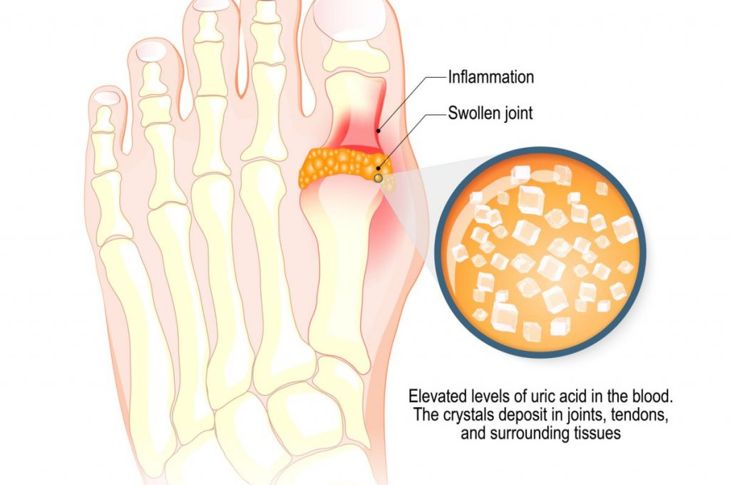Gout is a result of uric acid crystals accumulating in the joints. Gout can be extremely painful at times, particularly during episodic flare-ups. Gout can also affect other tissues throughout the body, like the kidney, for example. This can eventually lead to other complications, such as kidney stones. Gout is generally known to occur among men in their 40s. Gout is most common in men, age 45 and older, but the condition can develop at any age.
What is Uric Acid?
Purines are found naturally in the body and are the building blocks of your DNA. Your body has a built-in mechanism for breaking down purines. The result of this process is uric acid. Normally, this uric acid is dissolved into your blood where it passes through the kidneys and released through urine. Sometimes the body produces too much uric acid which results is urate crystals.
What if There’s Too Much Uric Acid?
When uric acid isn’t expelled quickly enough, it eventually builds up to form sharp needle-like urate crystals. Often these crystals accumulate in a joint or the surrounding tissue of a joint. This can eventually cause pain, inflammation, and swelling. The degrees of pain and swelling can begin as mild discomfort, but eventually untreated, can result in intense pain and even result in damage to the joint.
What are Some Symptoms of Gout?
In the early stages of a gout event, symptoms can manifest itself as pain or swelling. Your joint might also feel stiff, warm or even turn red. Many people get their first attack in the big toe, but this is not always the case. Often an attack of gout will come on suddenly and at night. The pain can be intense enough to wake you from a sound sleep. Even the touch of a bed sheet on the area can be excruciatingly painful.
Will I Have to Live With Constant Pain?
For most people, the gout attack will subside over the course of anywhere from three to ten days. This can even be the case without treatment or medication. Some people experience an episode and will not have another attack for several months, or even years. Over time, it’s not uncommon for the subsequent attacks to last longer and occur more frequently. In some cases, gout can advance to the point where it can cause permanent damage to the joints or kidneys. However, this is not the case with most people who seek proper treatment.
What are the Risk Factors for Gout?
Dietary factors play a major role in regulating uric acid levels. A diet that is heavy in meat and seafood can elevate these levels significantly, which can increase the risks for gout. Alcohol consumption has been identified as another factor that increases the likelihood of gout attacks. Drinking beverages containing fruit sugar (fructose) should also be avoided. Minimizing the consumption of these sweetened beverages will also help in maintaining a healthy weight. Obesity has also proved to be a clear risk factor for gout.
Complications Associated with Gout
Some people can have an attack of gout and never experience it again. However, there are those who will experience the symptoms of gout repeatedly, even multiple times in a year. Recurrent gout can be treated with medications, such as anti-inflammatory drugs. It is advised to seek treatment options, as gout can eventually erode and permanently destroy an affected joint. Advanced gout can cause deposits of urate crystals to collect in nodules under the skin. This condition is known as tophi (TOE-fie) and develops in such areas as the fingers, hands, feet, elbows and around the Achilles tendons. These areas can become tender and swollen during gout attacks.
What Can I Do to Prevent Gout?
After experiencing an attack of gout, some lifestyle changes can help to minimize and protect against future episodes. Make an effort to drink plenty of sugar-free fluids and stay hydrated as much as possible. Drinking filtered water throughout the day, rather than in a short period is always recommended. As much as possible, get your protein from low-fat dairy products, such as yogurt or eggs. There appears to be some evidence that these sources could have a protective effect against gout. Finally, maintain a desirable body weight without fasting or drastically restricting calories. Talk to your doctor about achieving ideal and realistic weight goals for your age, frame, and height.
What Should I Avoid to Prevent Gout?
There are also some practices that should be avoided to best decrease or minimize your risk for future gout attacks. It’s very important to limit drastically or, ideally, completely avoid alcoholic beverages. There appears to be mounting evidence to suggest that beer may be particularly likely to increase the risks of gout. This is true, especially for men over 40. Limit your intake of meat, fish, and poultry. It might be a good idea to keep a log to track what meats are triggering attacks.
Is There a Specific Test to Identify Gout?
There is a test that your doctor can provide that will determine if you show higher levels of uric acid than what is considered normal. If you have joint pain, there is an additional test where fluid can be drawn from the area to analyze for crystals of uric acid. Once it is determined that you have gout, your doctor will prescribe a course of action. This will likely involve diet change, weight management or medications.
Living with Gout
Given the severity of gout, only about 10 percent of people diagnosed with it are getting ongoing treatment. Untreated, gout can ultimately lead to more serious health issues such as kidney stones, destruction of the joints and even physical deformities, in the most severe cases. An accurate diagnosis and ongoing management are essential. Beyond the Do’s and Don’ts, weight management, medication, a sensible, well balanced, plant-based diet and regular exercise always go a long way in maintaining overall good health and well-being.

 Home
Home Health
Health Diet & Nutrition
Diet & Nutrition Living Well
Living Well More
More




















